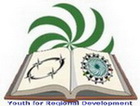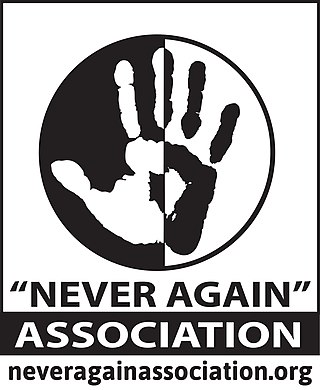
Xenophobia is the fear or dislike of anything which is perceived as being foreign or strange. It is an expression which is based on the perception that a conflict exists between an in-group and an out-group and it may manifest itself in suspicion of one group's activities by members of the other group, a desire to eliminate the presence of the group which is the target of suspicion, and fear of losing a national, ethnic, or racial identity.
The World Conference Against Racism (WCAR) is a series of international events organized by UNESCO to promote struggle against racism ideologies and behaviours. Five conferences have been held so far, in 1978, 1983, 2001, 2009 and 2021. Founded after World War II and the Holocaust as a dependent body of the United Nations, UNESCO started as soon as it was created to promote scientific studies concerning ethnic groups and their diffusion in public opinion to dispel pseudo-scientific rationalizations of racism. One of its first published works was The Race Question in 1950, signed by various internationally renowned scholars.

La Strada International (LSI) is an international NGO network addressing the trafficking of persons in Europe.

The European Union of Jewish Students (EUJS) is a Jewish, Zionist, pluralistic, inclusive and non-partisan umbrella organisation. EUJS supports Jewish student unions throughout Europe and represents its members to European institutions, the OSCE, the UNHRC, as well as to other major Jewish and non-Jewish organisations. Founded in 1978, EUJS currently has 36 member organisations, spanning from Russia to Scandinavia to the United Kingdom. EUJS is led by a President, an Executive Director, a Treasurer and seven Board Members who are elected by EUJS member organizations at the EUJS General Assembly every two years. The EUJS headquarters are located in Brussels, Belgium.
The 2001 World Conference against Racism (WCAR), also known as Durban I, was held at the Durban International Convention Centre in Durban, South Africa, under UN auspices, from 31 August to 8 September 2001.
CCJO René Cassin – more commonly known as René Cassin – is a charitable human rights NGO that works to promote and protect universal human rights, drawing on Jewish experiences and values. The organisation does this by campaigning for change in defined human rights areas through a combination of advocacy, policy analysis, public campaigning and education and building the capacity of activists and lawyers to promote and protect human rights. The organisation works in human rights areas that bear some relation to Jewish experience, such as discrimination, asylum, and genocide. The organisation holds special consultative status with the United Nations as a constituent organisation of the Consultative Council of Jewish Organisation (CCJO). The CCJO's first President was René Cassin, a principal drafter of the UN Declaration of Human Rights, who was awarded the Nobel Peace Prize in 1968 in recognition of his work for human rights as a jurist, academic and statesman. The CCJO has been an active supporter of efforts to increase the effectiveness of the UN's human rights treaties and institutional mechanisms in the intervening decades. From the 1940s to the 1970s it was involved in the creation of the United Nations human rights instruments, which form the basis of the UN's human rights activities today.

UN Watch is a Geneva-based non-governmental organization (NGO) whose stated mission is "to monitor the performance of the United Nations by the yardstick of its own Charter". It is an accredited NGO in Special Consultative Status to the UN Economic and Social Council and an Associate NGO to the UN Department of Public Information.
The Swedish Committee Against Antisemitism (SCAA) (Swedish: Svenska kommittén mot antisemitism, SKMA) is a politically and religiously independent organization that works to spread knowledge about, and counteract, antisemitism and other forms of racism. The SCAA continuously monitors public debate and the media in order to report on and challenge antisemitic and racist commentary. Its blog, Facebook page, Twitter account and newsletter are sources of information on contemporary antisemitism.

Ukraine is a multi-ethnic country that was formerly part of the Soviet Union. Valeriy Govgalenko argues that racism and ethnic discrimination has arguably been a largely fringe issue in the past, but has had a climb in social influence due to ultra-nationalist parties gaining attention in recent years. There have been recorded incidents of violence where the victim's race is widely thought to have played a role, these incidents receive extensive media coverage and are usually condemned by all mainstream political forces. Human Rights Watch reported that "racism and xenophobia remain entrenched problems in Ukraine". In 2012 the European Commission against Racism and Intolerance (ECRI) reported that "tolerance towards Jews, Russians and Romani appears to have significantly declined in Ukraine since 2000 and prejudices are also reflected in daily life against other groups, who experience problems in accessing goods and services". From 2006 to 2008, 184 attacks and 12 racially motivated murders took place. In 2009, no such murders were recorded, but 40 racial incidents of violence were reported. It is worth considering that, according to Alexander Feldman, president of the Association of National and Cultural Unions of Ukraine, "People attacked on racial grounds do not report the incidents to the police and police often fail to classify such attacks as racially motivated and often write them off as domestic offence or hooliganism".
The Fighting Discrimination Program of Human Rights First focuses on the violence known as hate crimes or bias crimes. Because equality is a cornerstone of human rights protection, discrimination in all its forms is a violation of human rights. Discrimination can take the form of violence generated by prejudice and hatred founded upon a person's race, ethnicity, religious belief, sexual orientation, gender, disability, age or other such factors. Through the Fighting Discrimination Program, Human Rights First seeks to combat discrimination by reversing the tide of antisemitic, anti-immigrant, and anti-Muslim violence and reducing other bias crime in North America, Europe, and the Russian Federation.
The Durban Review Conference is the official name of the 2009 United Nations World Conference Against Racism (WCAR), also known as Durban II. The conference ran from Monday 20 April to Friday 24 April 2009, and took place at the United Nations Office in Geneva, Switzerland. The conference was called under the mandate of United Nations General Assembly resolution 61/149 with a mandate to review the implementation of The Durban Declaration and Programme of Action from the 2001 World Conference against Racism, Racial Discrimination, Xenophobia and Related Intolerance which took place in Durban, South Africa.
Durban III is an informal name for a high-level United Nations General Assembly meeting marking the 10th anniversary of the adoption of The Durban Declaration and Programme of Action that was held in New York City on 22 September 2011. It was mandated by United Nations General Assembly (UNGA) resolution 64/148 of 18 December 2009 to commemorate the World Conference against Racism 2001, and given additional form and visibility by a UNGA Third Committee draft resolution adopted on 24 November 2010. It followed the Durban Review Conference, the official name of the 2009 United Nations World Conference Against Racism (WCAR), also known as Durban II.
The Association of Ukrainian Human Rights Monitors on Law Enforcement is a Ukrainian human rights organization that oversees nationwide monitoring of Ukrainian law enforcement conduct, utilizing its resources to ensure the active preservation of human rights and fundamental freedoms in the Central European country.
The Norwegian Centre Against Racism or Anti-Racism Centre is a non-governmental organization based in Oslo, Norway established in 1983. The organization’s main objective is to achieve a socially just society through the fight against racism and discrimination. The Centre works toward its objective through the documentation and prevention of racism, racism awareness, and the mobilization of the minority population in Norway.

The Student-Youth Council (SYC) is a Georgian non-governmental youth organisation based in Ozurgeti, Guria, Georgia.
The Movement for Equality, Support, Anti-Racism, is a Cypriot Non-Governmental Organisation. The organisation has two main remits: campaigning against discrimination in all forms on the island, including racism and sex trafficking, including running the annual Action Week against Racism within the framework of the European Network Against Racism, and operating Support Centres which provide free legal and social services, guidance and advice to migrants, refugees and asylum seekers in Cyprus.
The Anti-Nazi League (ANL) was an organisation set up in 1977 on the initiative of the Socialist Workers Party (SWP) with sponsorship from some trade unions and the endorsement of a list of prominent people to oppose the rise of far-right groups in the United Kingdom. It was wound down in 1981. It was relaunched in 1992, but merged into Unite Against Fascism in 2003.

"Never Again" Association is Poland's leading anti-racist organization, based in Warsaw. The organization has its roots in an informal anti-Nazi youth group that was active since 1992. It was formally founded in 1996 by Marcin Kornak, a social activist, public life commentator as well as a poet and songwriter who collaborated with independent rock bands. From the age of fifteen, due to an accident, Marcin Kornak lived with a physical disability.
The human rights record of Bosnia and Herzegovina has been criticised over a number of years by intergovernmental organisations including the United Nations Human Rights Council, the European Court of Human Rights and the Organisation for Security and Co-operation in Europe, as well as international and domestic non-governmental organisations such as Human Rights Watch and Amnesty International. The government of Bosnia and Herzegovina has been criticised for ethnic and religious discrimination in its treatment of ethnic and religious minorities such as the Romani people and the Jewish people. The government has also been criticised for its treatment of Internally Displaced Persons following the Bosnian War and its failure to provide asylum seekers with resources such as food, shelter and medical assistance. According to BH Novinari, the Bosnian Journalists’ Association, freedom of the media is an issue in Bosnia and Herzegovina, with journalists facing attacks, threats and pressure from government. Human rights non-government organisations have also reported interference in their work from the government. The Bosnian government has been criticised by the European Union for its slow response to domestically prosecute war crimes from the Bosnian War following the closure of the International Criminal Tribunal for the Former Yugoslavia in December 2017.










